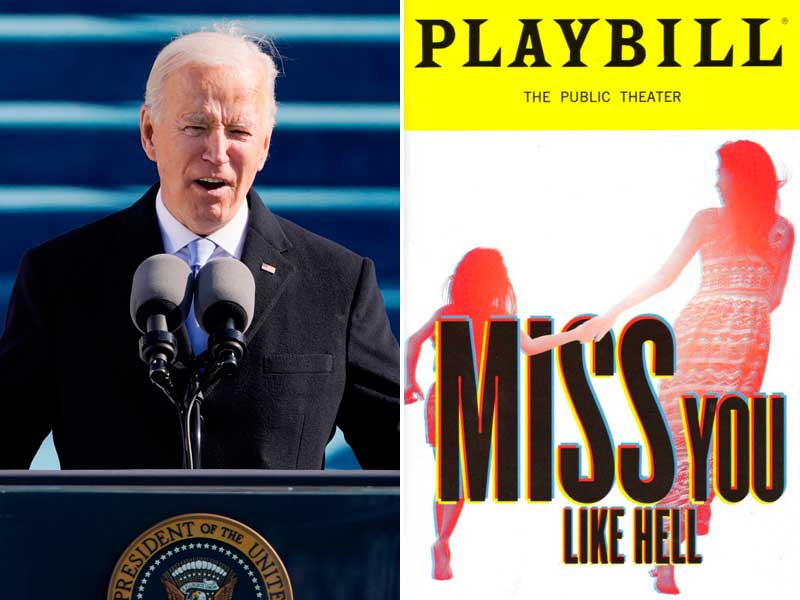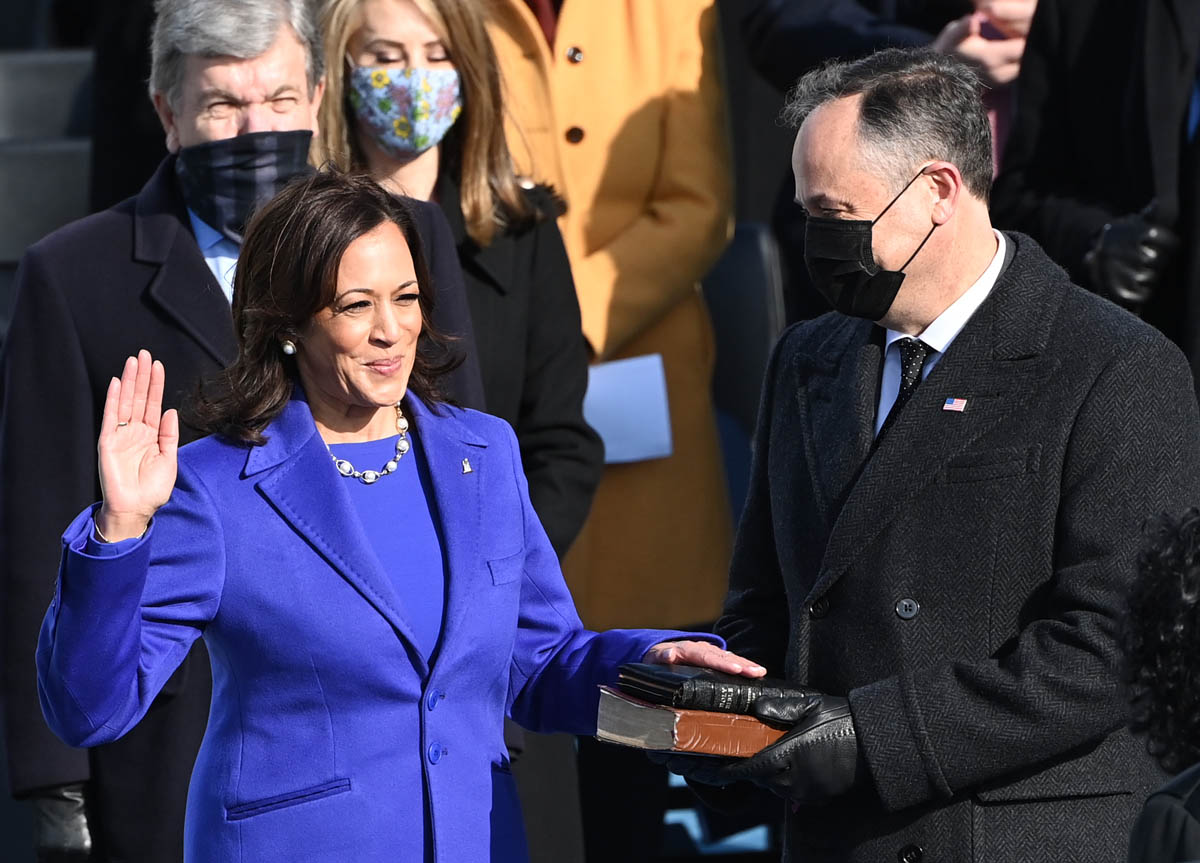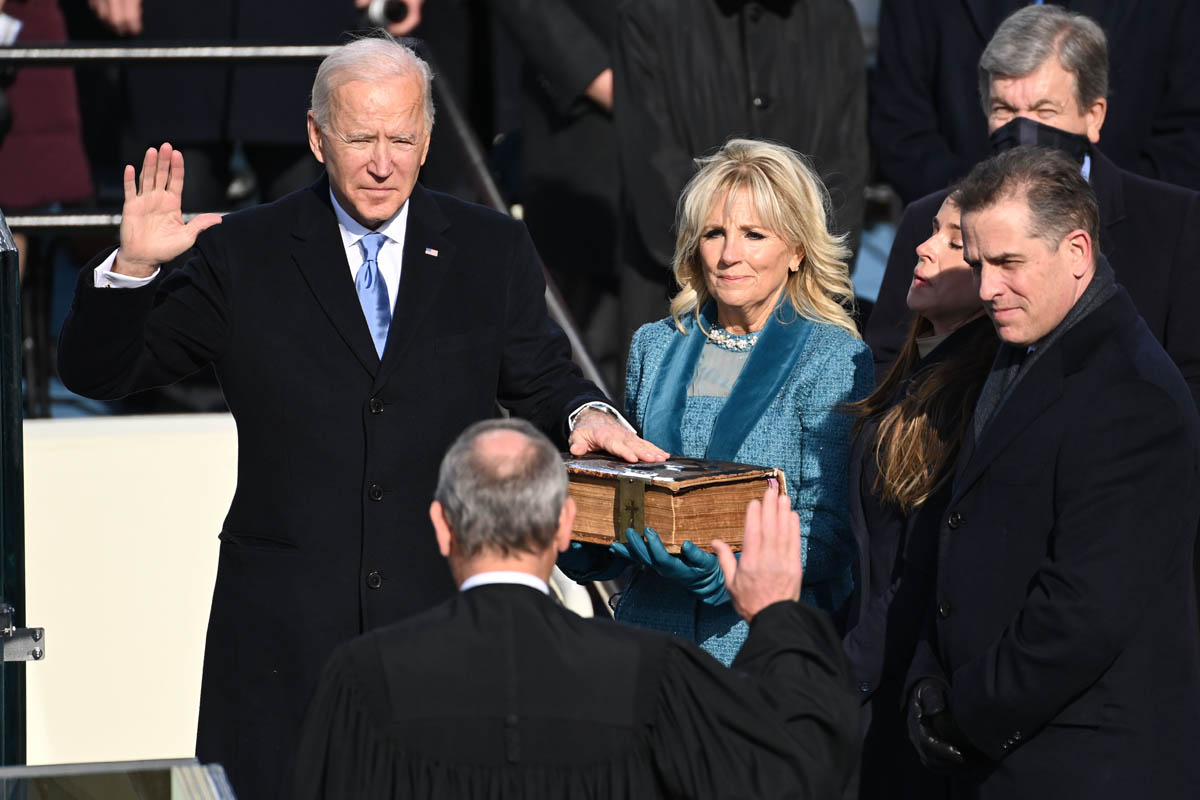Still Hurts Like Hell but… Miss You Like Hell



I can’t seem to land on the right word to describe how I feel after Joe Biden’s inauguration. I know it’s not …happiness, necessarily. To say I was not excited that he became the Democratic nominee would be an understatement. His declaration that, “This is not who we are,” and that “This is not America” after the January 6th insurrection at the U.S. Capitol exemplifies a set of ideologies that are part of what makes me disappointed in him as a representative.
January 6th is America. Or the United States of America, to be accurate. But I wasn’t surprised, after all, because in the words of Ibram X. Kendi, “denial is the heartbeat of America.”
When 45 was a candidate for the Republican party primaries, I was standing in a campus courtyard with a mentor and some colleagues, most of them men, when someone declared his candidacy would soon be over. That it was some sort of joke. That it wouldn't last. And I remember feeling silly, barely getting the courage to admit out loud to them that I disagreed. I was worried this man would become the party candidate. There was a small part of me that thought he could win.
I live a privileged life. I wasn’t born into one, but the life I lead now would surprise my 6 or 12 year-old self. It’s not one I would have imagined for myself, in more ways than one. I don’t know if it’s one even my mother dreamed for herself or for her daughter when she made her way north. And even with all of my privilege, the last four-plus years have been and felt rough. I have felt it in my body and in my heart. For example, the moment that man was elected, I developed a serious fear that my citizenship would be revoked, and that I might be permanently separated from my partner and my children. Reading just some of the devastatingly numerous stories of children separated from their families has affected me deeply. I don’t know how any person can be witness to this and be OK with it (and yes, I know these problems did not begin with Trump...being inhumane to the immigrant is also America). And while we are not all Stephen Miller, too many of us let him be Stephen Miller. Too many of us were OK with 45 being in office, and with this administration separating families with delight. I know seeing any of the images and reading any of the stories of the countless children we have traumatized has reopened the wound of my own separation from my mother. In the last four years I have felt Gloria Anzaldúa’s herida abierta in a very real way, and my separation from my mother was a cakewalk compared to what these children experienced and continue to experience. I can’t imagine their pain. I have the tiniest of insights, and it happened 23 years ago, and it still hurts like hell.
In the fall of 2016, I was offered a pair of complementary tickets to attend the opening night of a musical. I went without knowing much about the work--I only knew that Daphne Rubin-Vega would be performing, so my immediate reaction was…“I can see Rent’s original Mimi?! Yes, please!”
I don’t know if it was Rubin-Vega’s star power and the free tickets, or if it was the fact that I was teaching a ridiculous course load at the time, but I didn’t even bother to do the most basic of google searches. I had no idea what it would be about. But soon after it began, this show hit me deep. It fit perfectly with the research and writing I had done for my dissertation on the American Dream. But it was also a story that centered on a mother-daughter relationship and the legal and sociopolitical complications of migration. This musical was about a daughter and her estranged mother on a cross country road trip...on their way to the mother’s deportation hearing. I started to feel this impulse to run away. I don’t know how much I cried during the show or how loud the crying was. I was there with a friend, and she probably remembers, but I am too embarrassed/afraid to ask.
This musical was Miss You Like Hell, with music and lyrics by Erin McKeown and book and lyrics by Quiara Alegría Hudes. Quiara Alegría Hudes, of course, is a Pulitzer prize winner, American playwright, lyricist and essayist whose name you may know because she wrote the book for a little show called In the Heights. Her memoir, My Broken Language will be out in April of this year, and I can’t wait to get my hands on it.
After seeing Miss You Like Hell by accident, I knew I had to see it again on purpose, and I got my husband and me some tickets for another night as soon as I could. The crying this time I know was embarrassingly noticeable. When the show was over I stayed outside, comforted by my partner. When I saw Quiara Alegría Huides, I worked up the courage to meet her and thanked her. I don’t remember exactly what I said but I know that I told her about my work and about my life, and asked if it would be possible to either see the screenplay or ask more questions about the show. She told me to email the theater and ask them to put us in contact.
I emailed her right away. We corresponded briefly. This is part of an email I sent her in the afternoon of November 8th, 2016 (yes, you read that right):
“I think that one of the reasons I want to write about Miss You Like Hell is Beatriz. One of my frustrations with narratives about undocumented folks is that they have to present them or characterize them as perfect in order to argue for their "legalization." By the intermission on opening night, I turned to my friend and said, "She's an imperfect person! A complex woman!" I loved that as the audience we want Beatriz to stay, not because she is a "good" mother or a model citizen, but because she is a human being.
[…]
As I think I clumsily told you when I met you, my mother and I were separated for six years of my childhood--she left Monterrey, MX to work in el otro lado when I was six-years-old. Because my grandmother had 9 children and the first 4 shared a U.S.-born father, only half of my family is "legal." And that's just on my mother's side. So this show really spoke to me. I know what it's like to get married with only part of your family present. I know what it's like to be on the other side of the border when [relationship redacted] meets you with the mud of the río still clinging to [their] pants. I know what it's like to miss your mother because of a border you can't cross for six years. Watching the show felt like part of my family's story on the stage. It was validating, but it was also painful. I texted my mother who lives in TX the next morning (because I was so afraid to cry if I got her on the phone), and I asked her if she thought those six years would ever stop hurting. She said thinking about those years didn't hurt her anymore...because of the person I have become. And then I cried on my kitchen table on top of my students' essays. I hope one day I'll see this show with my mother--she loves musicals.
I came back to see the show last week because I wanted to know it better. And because I wanted to share it with my partner. Although he knows my family's story, I felt this show helped me tell him more of that story. I also wanted to see it again because this work is so timely. My mother, who considers herself to be "apolitical," is so nervous about tonight. She even voted early. The other night she told me, "no sé por qué, pero esta elección se ha sentido tan personal." But she knows. It's because she is an immigrant; it's because she is a woman.
Finally, I wanted to thank you because seeing the show has also inspired me. Although I stopped writing (creatively) during my doctoral program, post-graduation I feel like I keep getting signs that I need to pick up my pen and write again. I want to tell my mother's story...my family's story...my own...I don't know how that story will take shape or how I'll share it, but I know I must write it. Thank you for giving me one more sign.”
She was kind enough to write me back the next morning, even though she (like many of us) was hurting from the election results the night before. I hope she doesn't mind, but I’ll quote part of her reply here, because I want others to hear her message, because I think reading, experiencing, and creating art is a big part of our healing:
“Your mother and you will not be the last pair to feel that pain of separation. Those years do hurt--I am sorry you know that pain. Your mother was brave and bold. We owe it to her brave bold move to tell the truth.
All I can say is you must pick up that pen and write. Testify to what life in this country is. Tell the truth. Do it boldly, even if you feel alone. I don't care if it's nonfiction, fiction, poetry, anything. There is too much silence. Please create.
We need your story right now.”
I still don’t know how I feel after yesterday’s inauguration ceremony. I don’t even feel relief because I know this man is just a representation, a symptom, of the illness of white supremacy. But I can’t deny that I feel something about him being gone, even if what he’s stood for is still so very present. I can’t name this emotion but I do know that the last four years, especially the last one, has done a number on us. I know it’s done a number on me. But I will say, since Hudes’ message, I’ve worked harder as an educator and person to “testify” and “tell the truth” for my mother and for those whose pain felt more acute during 45’s presidency. And I’ll keep testifying, telling the truth, writing my story, and fighting for a more just world, even with Biden in office.
Here is a little bit of Miss You Like Hell’s Original Cast Recording:
Some of my favorites from the La Jolla Playhouse production:
Listen to the title song and try not to lose it. Just me? Maybe it’s all the memories. Of seeing the musical and memories of missing my mom:

